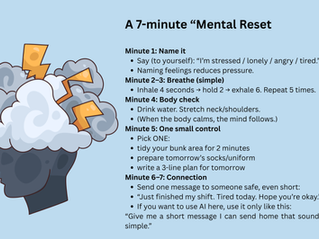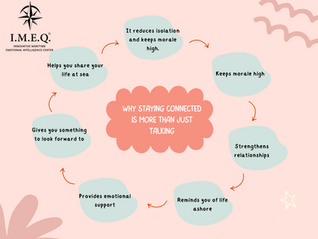Dealing with Heavy Workload Onboard: Essential Tips for Seafarers
- Sep 4, 2023
- 2 min read
Updated: Sep 12, 2023

Life at sea offers numerous rewards, but it also presents its unique set of challenges. Among these challenges is the heavy workload that seafarers often encounter, due to factors such as reduced crew sizes, rigorous compliance standards, and the unpredictable nature of maritime operations. Handling this effectively is vital not only for the individual's well-being but also for the safety and efficiency of the entire vessel. Here are some indispensable tips for seafarers dealing with a heavy workload onboard:
1. Time Management
Plan Ahead: Start the day with a clear plan. List down tasks and prioritize them based on urgency and importance.
Break Tasks into Steps: Breaking down larger tasks into smaller steps can make them feel more manageable and provide a clearer path to completion.
2. Effective Communication
Discuss with Superiors: If the workload feels consistently overwhelming, it's essential to communicate this to the officers or captain. They might offer solutions, redistribute tasks, or provide additional resources.
Team Collaboration: Working closely with teammates can lead to more efficient ways to tackle tasks or distribute the workload better.
3. Stay Organized
Utilize Tools: Make use of available tools, such as digital task managers or traditional logbooks, to keep track of tasks.
Maintain a Clean Workspace: A tidy workspace can reduce distractions and increase efficiency.
4. Take Regular Breaks
Short Breaks: Even a 5-minute break can help reset the mind and improve focus. It can be a quick stretch, a walk around the vessel, or a few moments of relaxation.
Adequate Rest: Ensure you get enough sleep. Fatigue can significantly decrease productivity and increase the risk of errors.
5. Manage Stress
Physical Activity: Engage in regular physical exercise, whether it's onboard workouts or simple stretches.
Mindfulness and Meditation: Techniques like deep breathing, meditation, or even short moments of reflection can help in managing stress.
6. Seek Support
Peer Interaction: Sharing concerns with peers can sometimes lead to solutions, shared experiences, or at least a sense of camaraderie.
Counseling Services: Some shipping companies offer counseling services for crew members. If available, don't hesitate to use them.
7. Continuous Learning
Skill Development: Upgrading skills or learning new techniques can often lead to more efficient ways of handling tasks.
Stay Updated: Being informed about the latest maritime regulations, tools, and best practices can aid in better workload management.
8. Set Boundaries
Learn to Say No: While it's crucial to be a team player, overburdening oneself consistently can lead to burnout. If you're already overwhelmed, it's okay to communicate your limits.
9. Focus on Health
Balanced Diet: Ensure you're consuming a nutritious diet to keep energy levels up.
Stay Hydrated: Dehydration can lead to fatigue and reduced concentration.
In conclusion, while heavy workloads onboard are often a part of seafaring life, how seafarers manage and cope can make all the difference. It's a combination of individual strategies, effective teamwork, and organizational support that paves the way for a more balanced and fulfilling maritime career.





































































































Comments